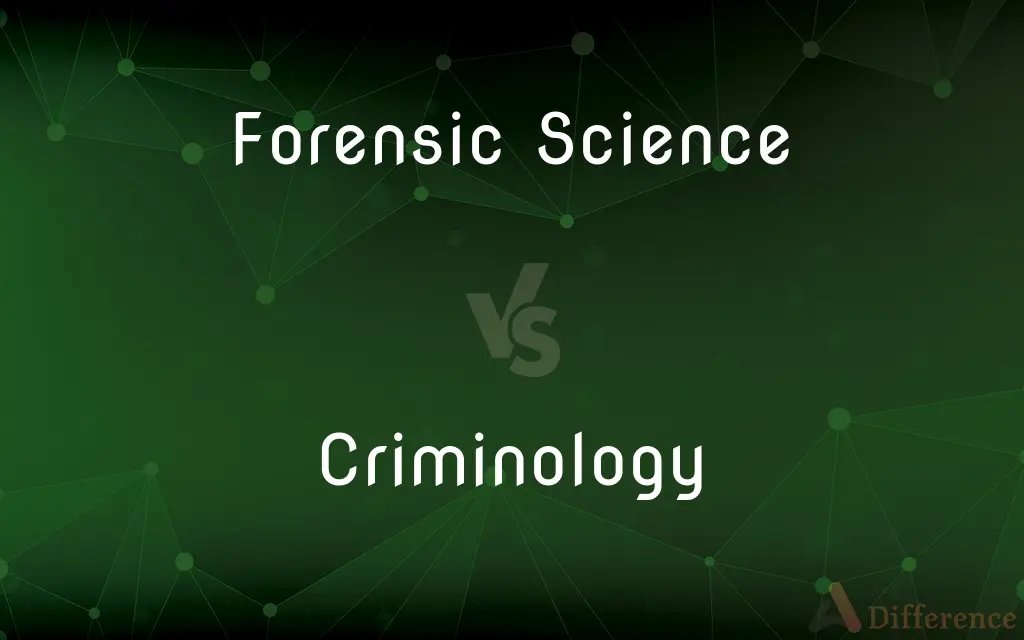Forensic Science vs. Criminology — What's the Difference?
By Tayyaba Rehman — Published on December 14, 2023
Forensic Science is the application of scientific methods to solve crimes, while Criminology is the study of crime, its causes, and its effects on society. Both are pivotal in understanding and addressing criminal behavior.

Difference Between Forensic Science and Criminology
Table of Contents
ADVERTISEMENT
Key Differences
Forensic Science and Criminology are crucial components of the criminal justice system. While Forensic Science applies scientific techniques to collect and analyze evidence from crime scenes, Criminology dives deep into understanding the nature of crime and the reasons behind criminal behavior.
In the realm of Forensic Science, experts use various tools and methods, from DNA analysis to ballistics, to aid in criminal investigations. Criminology, on the other hand, explores the sociological and psychological motivations behind criminal actions, offering insights into preventive measures.
Forensic Science often plays a vital role in the courtroom, providing objective evidence that can support or refute testimonies. Criminology plays a broader role, influencing policies, rehabilitation programs, and societal perceptions about crime and justice.
Practitioners in Forensic Science, such as forensic biologists or chemists, focus on the technical aspects of crime scene investigations. Those in Criminology, like criminologists or sociologists, are concerned with theories about crime causation and the societal response to criminal acts.
While Forensic Science and Criminology have distinct focuses, they intersect in many areas. Forensic evidence might inspire criminological studies, and criminological findings can guide forensic investigations. Both fields, however, aim to enhance justice and public safety.
ADVERTISEMENT
Comparison Chart
Primary Focus
Application of scientific methods to solve crimes
Study of crime and its societal implications
Role in Justice System
Collect and analyze evidence for investigations and trials
Understand and explain criminal behavior
Tools/Methods
DNA analysis, ballistics, toxicology, etc.
Sociological and psychological theories and studies
Practitioners
Forensic biologists, chemists, anthropologists, etc.
Criminologists, sociologists, psychologists
Outcome/Objective
Provide objective evidence for criminal cases
Influence policies, rehabilitation, and prevention measures
Compare with Definitions
Forensic Science
The application of science to criminal investigations.
The case was solved with the help of Forensic Science.
Criminology
An exploration of criminal behavior patterns.
Through Criminology, we can understand recurring crime trends.
Forensic Science
The intersection of law and scientific research.
Forensic Science played a decisive role in the court's judgment.
Criminology
Analysis of crime causation and prevention.
Modern Criminology explores the effects of societal structures on crime rates.
Forensic Science
A field dedicated to analyzing crime scene evidence.
Forensic Science revealed the true nature of the incident.
Criminology
The study of crime and its social impact.
Criminology offers insights into the reasons behind criminal acts.
Forensic Science
Techniques and tools to aid in legal inquiries.
Through Forensic Science, the mystery was unraveled.
Criminology
The sociological and psychological examination of crime.
Criminology aids in crafting effective rehabilitation programs.
Forensic Science
Scientific scrutiny of evidence for justice.
Forensic Science provided clarity in the complex case.
Criminology
Research into the societal response to criminal acts.
Criminology provides a lens to view society's perceptions of justice.
Criminology
The scientific study of crime, criminals, criminal behavior, and corrections.
Criminology
The study of crime and criminals, especially their behaviour.
Criminology
A treatise on crime or the criminal population.
Criminology
The branch of sociology which studies crime and criminals.
Criminology
The scientific study of crime and criminal behavior and law enforcement
Common Curiosities
What does Forensic Science primarily focus on?
The application of scientific methods to solve crimes.
How does Criminology contribute to the justice system?
By understanding and explaining criminal behavior.
Who typically works in the field of Forensic Science?
Forensic biologists, chemists, and anthropologists, among others.
Are Forensic Science and Criminology the same?
No, Forensic Science deals with evidence analysis, while Criminology studies crime and its societal implications.
Why is Criminology important for society?
It helps in understanding criminal behavior, influencing policies, and creating preventive measures.
What tools are commonly used in Forensic Science?
DNA analysis, ballistics, and toxicology, to name a few.
Does Criminology offer solutions to reduce crime rates?
Yes, it provides insights and suggestions for prevention and rehabilitation.
In what scenarios is Forensic Science typically applied?
In criminal investigations, to collect and analyze evidence.
What do criminologists study?
The nature of crime, its causes, and its effects on society.
How does Forensic Science aid in criminal trials?
By providing objective evidence that can support or refute testimonies.
Which field delves into the psychological aspects of crime?
Criminology.
How do Forensic Science and Criminology intersect?
Forensic evidence might inspire criminological studies, and vice versa.
What's the goal of Forensic Science?
To provide objective evidence for criminal cases.
Is Forensic Science limited to laboratory work?
No, it encompasses fieldwork, laboratory analysis, and its application in legal contexts.
How does Criminology influence public perceptions?
By researching and explaining the societal response to criminal acts.
Share Your Discovery

Previous Comparison
Bill Discounting vs. Factoring
Next Comparison
Acid Anhydride vs. Basic AnhydrideAuthor Spotlight
Written by
Tayyaba RehmanTayyaba Rehman is a distinguished writer, currently serving as a primary contributor to askdifference.com. As a researcher in semantics and etymology, Tayyaba's passion for the complexity of languages and their distinctions has found a perfect home on the platform. Tayyaba delves into the intricacies of language, distinguishing between commonly confused words and phrases, thereby providing clarity for readers worldwide.
















































